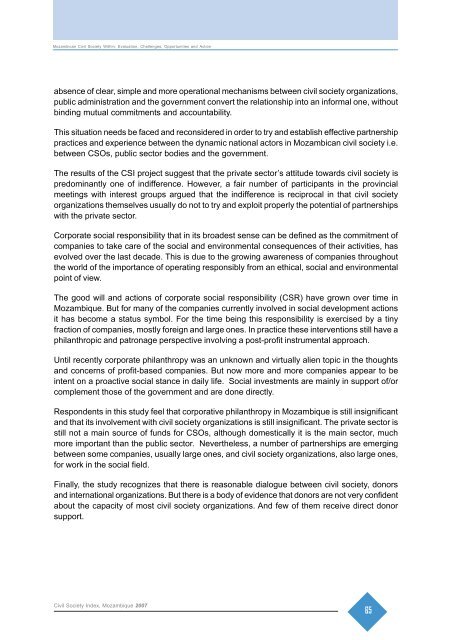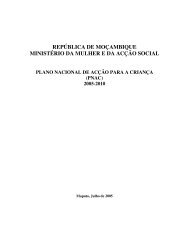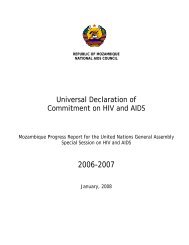Mozambican Civil Society Within: - UNICEF Mozambique - Home page
Mozambican Civil Society Within: - UNICEF Mozambique - Home page
Mozambican Civil Society Within: - UNICEF Mozambique - Home page
Create successful ePaper yourself
Turn your PDF publications into a flip-book with our unique Google optimized e-Paper software.
<strong>Mozambican</strong> <strong>Civil</strong> <strong>Society</strong> <strong>Within</strong>: Evaluation, Challenges, Opportunities and Action<br />
absence of clear, simple and more operational mechanisms between civil society organizations,<br />
public administration and the government convert the relationship into an informal one, without<br />
binding mutual commitments and accountability.<br />
This situation needs be faced and reconsidered in order to try and establish effective partnership<br />
practices and experience between the dynamic national actors in <strong>Mozambican</strong> civil society i.e.<br />
between CSOs, public sector bodies and the government.<br />
The results of the CSI project suggest that the private sector’s attitude towards civil society is<br />
predominantly one of indifference. However, a fair number of participants in the provincial<br />
meetings with interest groups argued that the indifference is reciprocal in that civil society<br />
organizations themselves usually do not to try and exploit properly the potential of partnerships<br />
with the private sector.<br />
Corporate social responsibility that in its broadest sense can be defined as the commitment of<br />
companies to take care of the social and environmental consequences of their activities, has<br />
evolved over the last decade. This is due to the growing awareness of companies throughout<br />
the world of the importance of operating responsibly from an ethical, social and environmental<br />
point of view.<br />
The good will and actions of corporate social responsibility (CSR) have grown over time in<br />
<strong>Mozambique</strong>. But for many of the companies currently involved in social development actions<br />
it has become a status symbol. For the time being this responsibility is exercised by a tiny<br />
fraction of companies, mostly foreign and large ones. In practice these interventions still have a<br />
philanthropic and patronage perspective involving a post-profit instrumental approach.<br />
Until recently corporate philanthropy was an unknown and virtually alien topic in the thoughts<br />
and concerns of profit-based companies. But now more and more companies appear to be<br />
intent on a proactive social stance in daily life. Social investments are mainly in support of/or<br />
complement those of the government and are done directly.<br />
Respondents in this study feel that corporative philanthropy in <strong>Mozambique</strong> is still insignificant<br />
and that its involvement with civil society organizations is still insignificant. The private sector is<br />
still not a main source of funds for CSOs, although domestically it is the main sector, much<br />
more important than the public sector. Nevertheless, a number of partnerships are emerging<br />
between some companies, usually large ones, and civil society organizations, also large ones,<br />
for work in the social field.<br />
Finally, the study recognizes that there is reasonable dialogue between civil society, donors<br />
and international organizations. But there is a body of evidence that donors are not very confident<br />
about the capacity of most civil society organizations. And few of them receive direct donor<br />
support.<br />
<strong>Civil</strong> <strong>Society</strong> Index, <strong>Mozambique</strong> 2007<br />
65
















